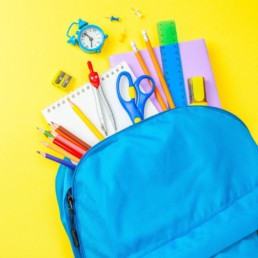
In the coming months parents up and down the land will hear all about how to get their child ‘school ready’, but what does this really mean?
Often, usually at the end of summer, schools and nurseries will discuss with parents what they can do to get their child ready for school. Historically, there has been a common interpretation that this should revolve around a knowledge of letters and numbers; parents can become worried when they compare their child to others. There is often a belief that children’s success in later life is pinned upon their ability to read from the outset and ‘know’ numbers to 100. However, we firmly believe that accelerated learning does not equate to quality learning.
When families joining The Abbey Junior School ask us what they can do to get their 4 year old ‘ready’ for September, we suggest:
- Fostering independence- managing own needs, changing for PE, doing up coats and shoes and packing their bags.
- Having conversations- this skill can become easily lost in a busy life where computers and phones are all pervasive, but making the time to learn communication skills, turn taking, eye contact etc. are fundamental life skills.
- Listening skills- sharing stories and focusing on activities for up to 10 minutes will help children take a positive step into the classroom
A quality Reception experience will build upon firm foundations of early learning and these skills are highly desirable in any classroom as it enables children to focus on other skills and learning.
Here, at The Abbey, when we meet children hoping to join our Reception we are not expecting a vast knowledge of graphemes, tricky words or an ability to count to 100. Instead we hope to meet young people who demonstrate a willingness to engage in conversation and learning, to express their own ideas, display curiosity and enthusiasm when exploring their environment. A positive attitude and aptitude for learning, enables us as teachers to work with children on the principles of ‘how’ we learn.
Reception is marked as the start of formal education in the UK. It is a formative year, and, as a teacher, hugely rewarding, as young minds have a world opened up to them acquiring skills such as reading and writing. This is also a year where children learn ‘how to be’ in school. We are not talking of creating a stylised or formal approach to learning and teaching, but that children begin to understand the role school plays in their own learning and development and how they can flourish in the school environment – which is different from home. Even the youngest children can reflect upon their learning so far and we equip them with the language and comfort of discussing their progress, their learning and ‘where next’.
In an education culture where children (or perhaps more so their parents) are often focused on a perceived, narrow ‘end goal’ (qualifications, exam results etc.) it is crucial that educators, including parents, fight back and recognise that formal skills in learning have their place and time but they are not at the core of what children need in their education as we look to the future.
